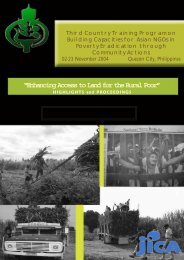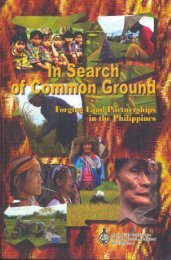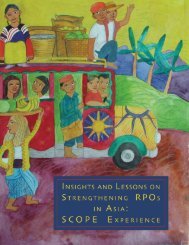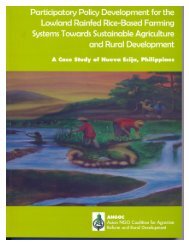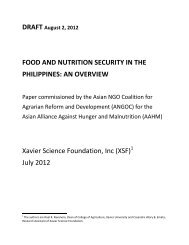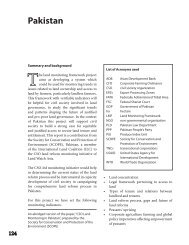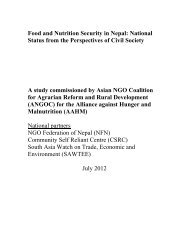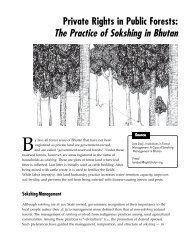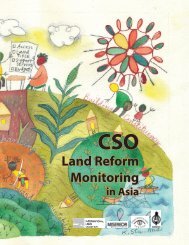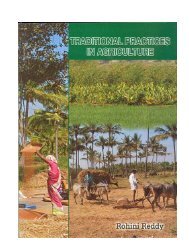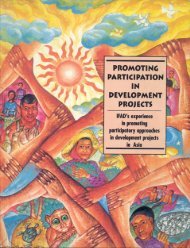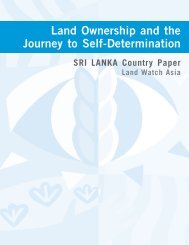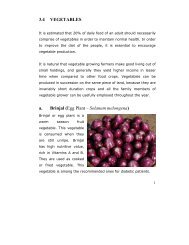Securing the Right to Land FULL - ANGOC
Securing the Right to Land FULL - ANGOC
Securing the Right to Land FULL - ANGOC
You also want an ePaper? Increase the reach of your titles
YUMPU automatically turns print PDFs into web optimized ePapers that Google loves.
NGOs perceive <strong>the</strong>mselves as being at a strong disadvantage<br />
when dealing with <strong>the</strong> Government. Important information<br />
from <strong>the</strong> Government continues <strong>to</strong> be inaccessible,<br />
and <strong>the</strong> Government often ignores recommendations put<br />
forward by NGOs. Partnerships with <strong>the</strong> Government have<br />
not been effective because <strong>the</strong> political environment precludes<br />
transparency on <strong>the</strong> part of <strong>the</strong> State, and largely<br />
because of this, <strong>the</strong>re is no trust between <strong>the</strong> two groups.<br />
The Government has little regard for NGOs and often tries <strong>to</strong><br />
intimidate <strong>the</strong>m and restrict <strong>the</strong>ir rights.<br />
A clear example of <strong>the</strong> Government’s unwillingness <strong>to</strong><br />
work with NGOs is its lack of interest in joining <strong>the</strong> <strong>Land</strong> Partnership<br />
Study that was conducted by STAR Kampuchea and<br />
<strong>the</strong> NGO Forum of Cambodia. These two networks believe that<br />
Government’s reluctance <strong>to</strong> participate in <strong>the</strong> study epi<strong>to</strong>mizes<br />
<strong>the</strong> current problems of lack of communication and trust,<br />
which hinder opportunities for partnership on land issues.<br />
Disharmony Between Donor and Government Programs<br />
While international donor organizations declare <strong>the</strong>ir intent<br />
<strong>to</strong> work in harmony with <strong>the</strong> Government, <strong>the</strong> uncoordinated<br />
donor support for different methods of land use mapping<br />
in Cambodia is proof <strong>to</strong> <strong>the</strong> contrary.<br />
Political Apathy of Donors<br />
International donor and development organizations are primarily<br />
oriented <strong>to</strong>ward providing technical support. The majority<br />
of <strong>the</strong>m avoid getting enmeshed in controversial or<br />
political issues. They have never used <strong>the</strong>ir political clout <strong>to</strong><br />
pressure <strong>the</strong> Government <strong>to</strong> improve its human rights<br />
record, and observers believe <strong>the</strong>y will not begin anytime<br />
soon, i.e., become advocates against landlessness and o<strong>the</strong>r<br />
land disputes.<br />
Constraints <strong>to</strong> Streng<strong>the</strong>ning NGO–Donor–Government<br />
Relationships<br />
Firstly, <strong>the</strong>re is a power imbalance between National NGOs<br />
and international development and donor organizations, and<br />
this is tilted against <strong>the</strong> former. Secondly, donors feel that <strong>the</strong><br />
inherent mistrust between <strong>the</strong> Government and NGOs restricts<br />
progress for tripartite cooperation in regard <strong>to</strong> land<br />
and natural resources management, and believe that land<br />
distribution would be more effective if <strong>the</strong> Government<br />
and <strong>the</strong> private sec<strong>to</strong>r were <strong>to</strong> team up instead. Thirdly,<br />
donors and development organizations question <strong>the</strong> legitimacy<br />
of NGOs <strong>to</strong> represent affected communities and vul-<br />
OVERCOMING A FAILURE OF LAW AND POLITICAL WILL<br />
73<br />
nerable groups, since <strong>the</strong> latter do not normally elect which<br />
NGOs would speak on <strong>the</strong>ir behalf. Donors prefer increased<br />
direct representation and organization by affected peoples.<br />
Donors are also concerned that a number of NGOs are not<br />
genuinely interested in empowering people, but operate<br />
more as private enterprises concerned with turning a profit.<br />
Endnotes<br />
1<br />
Cristina Mansfield, Advocacy in Cambodia: Increasing Democratic<br />
Space, 2002, Phnom Penh, Cambodia<br />
2<br />
See NGO Forum on Cambodia: Rethinking Poverty Reduction <strong>to</strong> protect<br />
and promote <strong>the</strong> rights of indigenous minorities in Cambodia: A<br />
Human <strong>Right</strong>s approach <strong>to</strong> land and natural resources management.<br />
April 2005, p. 7.<br />
3<br />
STAR Kampuchea’s <strong>Land</strong> Partnership Study, conducted from Oc<strong>to</strong>ber<br />
2006–March 2007.<br />
4<br />
Report of <strong>the</strong> Special Representative of <strong>the</strong> Secretary–General for Human<br />
<strong>Right</strong>s in Cambodia, Mr. Yash Ghai, February 2006, Paragraph 39.<br />
5<br />
Prime Minister Hun Sen, “Address at <strong>the</strong> First Cambodia Development<br />
Cooperation Forum,” Phnom Penh, 19 June 2007: paragraph 38.<br />
6<br />
It was reported <strong>to</strong> STAR Kampuchea interviewers that <strong>the</strong> company<br />
once approached <strong>the</strong> communities with an offer <strong>to</strong> settle <strong>the</strong> growing<br />
dispute but residents refused.<br />
7<br />
Due <strong>to</strong> <strong>the</strong> large size and nature of <strong>the</strong> land it can be concluded that<br />
<strong>the</strong> concession must have been decided by <strong>the</strong> National Government<br />
and not only by <strong>the</strong> Ministry of Agriculture.<br />
8<br />
Prime Minister Hun Sen, “Address at <strong>the</strong> First Cambodia Development<br />
Cooperation Forum,” Phnom Penh, 19 June 2007: paragraph 40.<br />
References<br />
Brownell, M. (2007). Statement on agriculture and natural resources management.<br />
Testimony given at first Cambodia development cooperation<br />
forum, Phnom Penh.<br />
Cambodia Development Review. (2006). The World Bank’s 2006 Cambodia<br />
poverty assessment: A CDRI response. Phnom Penh: Cambodia Development<br />
Review.<br />
Cambodian League for <strong>the</strong> Promotion and Defense of Human <strong>Right</strong>s<br />
(LICADHO). (2006). Human rights in Cambodia: The façade of stability.<br />
Phnom Penh: LICADHO.<br />
Community Based Natural Resource Management Learning Initiative.<br />
ASIAN NGO COALITION FOR AGRARIAN REFORM AND RURAL DEVELOPMENT



